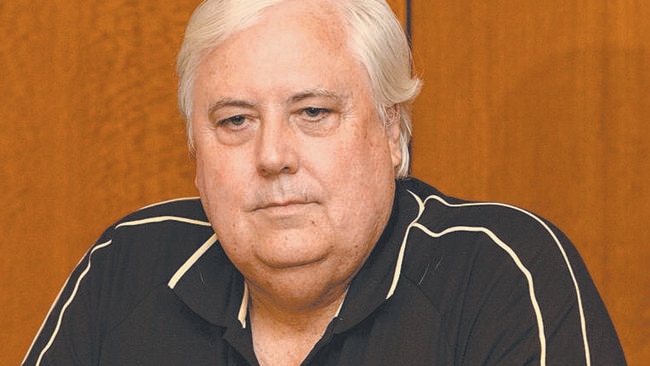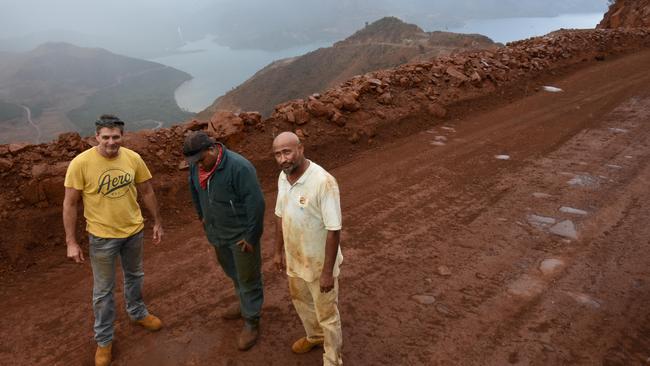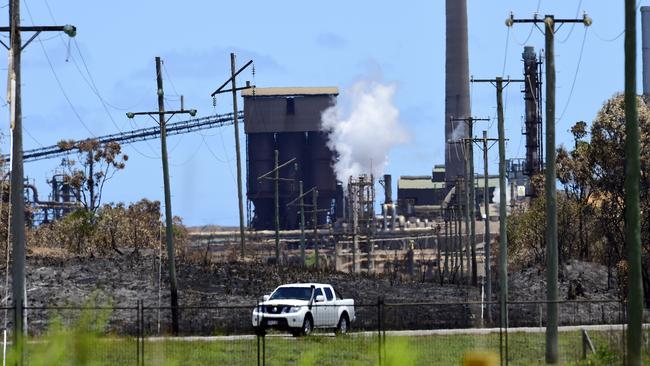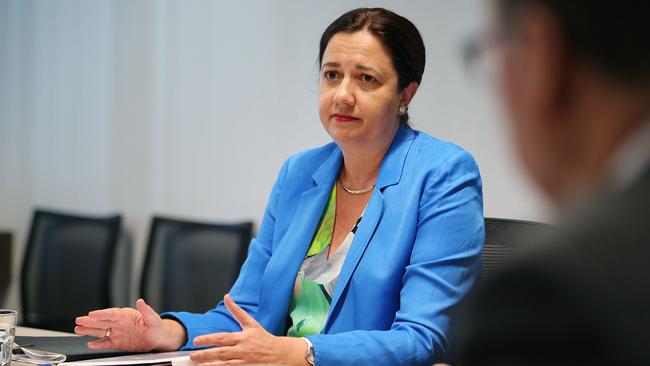Fears for civil unrest in New Caledonia over possible closure of Queensland Nickel refinery
AS CLIVE Palmer’s minerals empire crumbles, the President of New Caledonia is bracing for violence and political unrest if a nickel refinery closes.

THERE are fears the collapse of Clive Palmer’s nickel empire could trigger civil unrest in New Caledonia, just weeks after its president personally warned the mining magnate of a potentially violent fallout.
News that Mr Palmer’s flailing Queensland Nickel business had been sent into voluntary administration on Monday sent shock waves through the French overseas territory, which relies heavily on its nickel ore exports income — Mr Palmer is one of its top customers.
As anger mounts in Australia over the loss of 237 jobs from Queensland Nickel’s Yabulu refinery in Townsville, there is real concern a future closure or mothballing of the refinery will spark political unrest and violence in New Caledonia, where a quarter of all private sector employment relates to nickel exports.
“If Yabulu collapses, there would be dire consequences for the country as a whole,” an anonymous government agency source told The Guardian.
“The impact would be tremendous. It would possibly trigger some industrial conflict and social discontent. And the government would be in a difficult situation.”
New Caledonian president Philippe Germain personally warned Mr Palmer against closing his refinery at a meeting in November.

In a sworn affidavit, obtained by The Australian last month, Queensland Nickel managing director Clive Mensink said: “I am advised by Mr Palmer ... they expressed their concern as to whether Queensland Nickel would continue to buy ore and that the failure of Queensland Nickel to be in a position to do so would result in political unrest, violence and even closure of mines in New Caledonia, as Queensland Nickel has been the sole purchaser of laterite nickel ore for the last 20 years.”
Mr Mensink said there were about 500 people in New Caledonia working on the mines that sourced Queensland Nickel’s supply.
“These people would lose their jobs if Queensland Nickel stopped buying nickel from New Caledonia,” he said.
There is already tension in New Caledonia following Mr Germain’s refusal last year to grant export licences to independent local miners who wanted to sell laterite nickel ore to customers other than Queensland Nickel. The decision sparked protests and industrial blockades, The Guardian reported.

New Caledonia, about 1470km northeast of Brisbane, hosts about a quarter of the world’s known nickel deposits.
FTI Consulting said on Monday it had taken over administration of Queensland Nickel, which has reported debts of about $70 million.
The 237 refinery workers who lost their jobs are yet to hear if they’ll get their superannuation payments, but the administrators told the Australian Workers’ Union that Queensland Nickel doesn’t have the cash to payout workers’ entitlements.
The union’s secretary Ben Swan told the ABC the situation was a nightmare for workers.
“There are people who have made substantial commitments even in the last couple of months in terms of their livelihoods who are now going to be facing financial ruin,” he said.
There is also a cloud over the job security of a further 550 workers.
Mr Palmer has not spoken to the media since the administrators took over but has instead taken to Twitter, tweeting yesterday: “Labor and the Liberals should stop attacking Queensland Nickel and media should focuses (sic) on issues”.
Labor and the Liberals should stop attacking Queensland Nickel andMedia should focuses on issues
— Clive Palmer (@CliveFPalmer) January 18, 2016QNI has spent $4bn in North QLD since 2009. Liberal & Labor would be lucky to have spent that combined #auspol #qldpol
— Clive Palmer (@CliveFPalmer) January 19, 2016QNI has kept 2500 employed in Townsville in the last 6 years. Politicians dont know what reality is. #auspol
— Clive Palmer (@CliveFPalmer) January 19, 2016But Queensland Premier Annastacia Palaszczuk, who flew to Townsville for crisis talks and to meet affected workers, said Mr Palmer had a duty to tell his sacked workers if they’ll get their entitlements.
“Why he has let them down, and are they going to get their entitlements?” she told the Nine Network.
“It is simply not good enough for Mr Palmer and Queensland Nickel to sit by and not communicate with the workforce that has devoted their entire life to this company.”
Ms Palasczuzuk said her government was working on fast-tracking public works projects to create jobs for sacked workers.
But she denied she had ever offered Mr Palmer a loan to prop up his flailing business.
“It was never conceivable that we could give them a loan,” she said.
“The Federal Government has come out and said exactly the same thing.”
Mr Palmer has blamed poor nickel prices, which are at a 15-year-low, for the job losses.
He has also repeatedly defended his decision to use more than $20 million from Queensland Nickel to bankroll his Palmer United Party, saying he did it to campaign on issues for the greater good.
“In 2013, I could have received $15m as a dividend from QNI (Queensland Nickel),” he tweeted yesterday. “Instead it was donated to PUP which mandated a reduction in electricity prices”.
Mr Mensick insists the company will trade out of its current problems.




